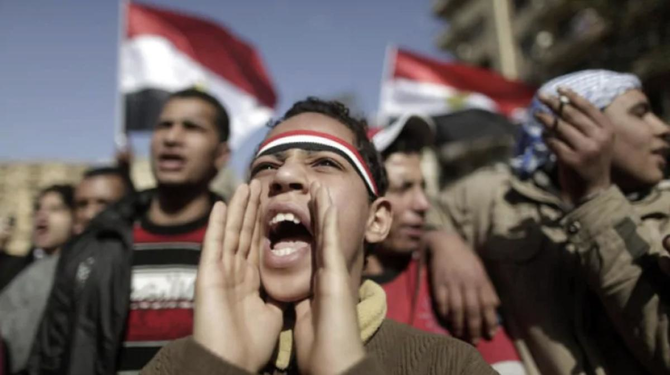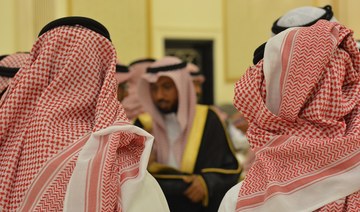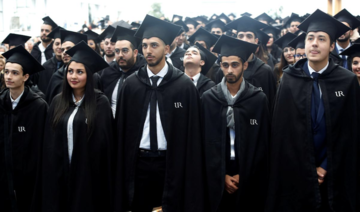LONDON: Wars and turmoil in the Middle East and North Africa (MENA) region are having a marked impact on youth unemployment, according to a former top UN official.
And unless tensions are eased the outlook for many young Arabs remained bleak, said international diplomatic adviser, Christer Elfverson.
His comments follow figures from the International Labor Organization (ILO), showing that one in five young people under the age of 25 in the region are jobless and have no skills, and in some countries the issue is becoming more acute.
Elfverson, who spoke at a recent event hosted by Education for Employment (EFE) in collaboration with Citi Foundation, told Arab News that the diversity in the Arab world was partly due to population growth and GDP.
But he added that turmoil and wars in the region had also affected unemployment rates, and a lack of initial education in some MENA countries was concerning for future generations.
Salvatore Nigro, EFE global VP and CEO, said that the MENA region had the highest percentage of young people, with 65 percent under the age of 25, yet unemployment rates were running at an average of 30 percent.
More than 27 million young people will come of working age in the next five years, creating even more pressure and competition in the jobs market. However, MENA countries often face very different problems.
In some mountainous regions of Morocco, for example, it is difficult and dangerous for children to undertake daily journeys, whereas Syrian or Palestinian refugees do not have the money for school transport or books.
“In some issues, it has gotten better and others it’s worse but at the same time those in the countries that have been able to find jobs then maybe the possibilities are greater now. But it is two different worlds,” said Elfverson, who is an EFE board member.
Abdesselam Aboudrar, the Moroccan ambassador to London, said that the education system in his country was currently being reformed. He added that the illiteracy rate had decreased from just over 40 percent to about 25 percent, which although “still a lot,” had been slashed over the past 10 years. “We are reforming the whole system to make it more effective and more empowering for youth,” the envoy said.
Aboudrar told Arab News that Morocco had been working with several NGOs and countries including Japan, China, Russia, Canada and EU nations to develop the maritime, industrial and textile sectors and encourage more young people to take jobs in these fields.
The ambassador said vocational training was a very important aspect in preparing young people for current and future jobs. It was also vital to simultaneously train youth in supplying water, maritime and fisheries, developing skills in the automotive, computing, agricultural and tourism industries, to curb poverty, educate women and provide young girls with access to education.
When it came to the MENA region, David Cowan, Citi Africa economist, compared Saudi Arabia with Algeria due to the oil factor.
“The level of growth and employment per dollar of government spending is one of the lowest in the world. If the Saudi government spends $10, the amount of jobs and growth that number generates is much lower than, for example, in many other countries. So that is a problem,” he said.
Cowan added that Saudi Arabia had a high level of revenue with no constraint but said: “It is how you spend that revenue wisely. Sometimes you need to spend money on lower-profile projects that may generate more employment in the long run.”
Jordan’s EFE chief executive officer, Ghadeer Khuffash, told Arab News that this quarter’s unemployment rate had increased to 19 percent. She said there was “economically active people in Jordan and there are economically inactive people.” The inactive ones were not working or looking for jobs.
“In Jordan 87 percent of females are economically inactive, which means only 14 percent of the women are contributing to the labor market. So, in our work we don’t only target unemployment or unemployed youth, but we also target those who are economically inactive.”
Not only is Jordan suffering from a high unemployment rate, but the country also has to bear the responsibility of millions of refugees or displaced persons and borders states that have endured years of war and unrest.
Refugees often do not have valid permits and are not able to leave camps. Those that do are barely able to move within the camp, let alone leave to go to work.
Regarding the challenges females face in employment, Khuffash said: “All the reports from the World Bank and so on, highlight the lack of public transportation systems and nursery care.”
She added that most of the work was predominantly in the capital Amman and the northern city of Irbid. The other governorates had minimal job opportunities.
One key factor however remains consistent: As candidates filter into the market, it has become evident that they are ill-prepared for the workforce, whether coming from a disadvantaged background or a more educated path. The problem cannot be solved by simply modernizing education and labor markets.
Speaking to Arab News, Cynthia Muller, board member of EFE-Europe, said the EFE had a measurable, traceable and easily comprehensible mission that did not need a lot of due diligence because “the money goes to where it is supposed to go. And it’s affectively being put to work.
“There is a bit of magic when you have humans together with a common mission who have not had the privilege of being attended to on a silver plate. I have been amazed to see people change their life with a very small amount of help by getting that first job,” the hedge fund banker added.
The chairman of the Arab International Youth Forum said they want to see their youth employed and women more engaged in the private sector, not only in Saudi Arabia, across the region.
“Youth is the richest asset of the Arab region, but also is a huge challenge because of the lack of jobs or the mismatch between the education system and the jobs on the market,” Haifa Al Kaylani told Arab News.
Meanwhile, Abdullah Jasem, president of Emirates Trade and Investment, said the youth’s contributions to Arab economies is going to be a significant part in global trade and investment going forward.
“We have a large population in the MENA region, most of whom overwhelmingly are below 35, and these are people with a lot of energy and they're being highly empowered by their governments, particularly the UAE where it has initiatives not just for its own citizens, but all Arabs,” he told Arab News.
For any economy to advance it needs human talent. “Anything that affects the economy and the country, and the well-being of people affects the youth more than the adults,” said Elfverson.






























